WEEE Directive: Time for Ambitious Reuse Targets and Strong Enforcement
July 4, 2025
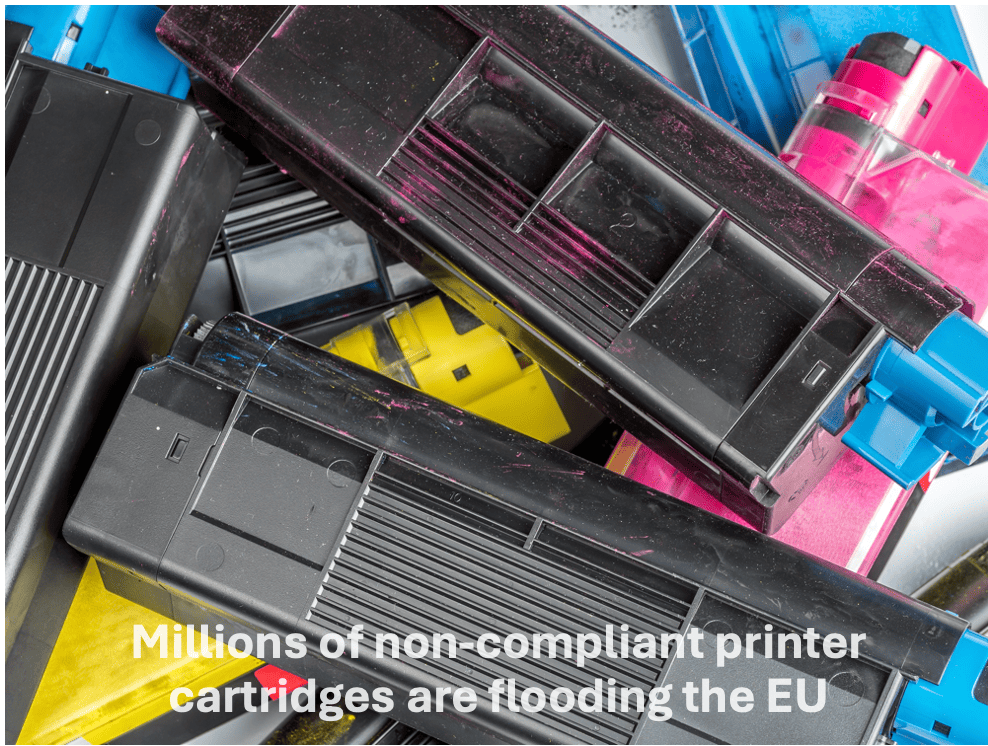
The European Commission’s newly published evaluation of the Waste Electrical and Electronic Equipment (WEEE) Directive confirms what ETIRA has long stated: the legislation is no longer fit for purpose. With collection targets widely missed, critical raw materials lost, and unfair competition distorting the market, the EU must act decisively to bring reuse and remanufacturing to the forefront of the circular economy.
“Linear manufacturers are not the right actors to lead the change,” said ETIRA President Javier Martinez. “WEEE keeps growing faster than it is being treated. In sectors with high circular potential, like imaging, we need to be bold — and we need to establish ambitious reuse targets now.”
The WEEE Directive, which governs the collection and treatment of electrical and electronic waste across the EU, has been in place for over two decades. While the Commission’s evaluation describes the legislation as “relevant, coherent and proportionate”, it also identifies five major shortcomings:
- Poor collection rates
- Limited recovery of critical raw materials (CRMs)
- Fragmented Extended Producer Responsibility (EPR) schemes
- Inconsistent treatment standards
- An outdated product scope
In 2022, only three Member States met the EU’s 65% collection target. Nearly half of the WEEE generated in the EU is not being collected. Valuable materials, such as copper, gallium, tungsten, and rare earths, continue to be lost to landfills and incineration.
For ETIRA and the imaging equipment reuse sector, these findings confirm that the current system disproportionately benefits single-use, linear models, especially new-build cartridges and printers that are imported into the EU without contributing to national EPR systems.
“For every single-use clone that enters, two reuse cycles are lost,” said Martinez. “The empty OEM cartridge is not reused, and the clone cannot be reused. That is devastating for circularity.”
Unfair competition from non-compliant, low-quality imports, often sold online, continues to undermine efforts by legitimate remanufacturers. The Commission itself flags the failure to enforce existing rules, particularly with online marketplaces. ETIRA has repeatedly raised this issue in relation to RoHS enforcement, with little tangible result.
“Voluntary compliance is not working. Enforcement must now be central to WEEE reform,” Martinez added. The new WEEE should create a separate category for cartridges, with a minimum reuse target of 30% -40%, gradually growing to 80%-90%. The technology and infrastructure to do that exists; what is missing is the economic incentive: our locally produced, environment-friendly alternative cannot compete with the thousands of polluting, cheap, single-use, non-OEM cartridges dumped on the EU market every day.
The evaluation also references the EU’s upcoming fully digital Waste Shipment System, which is expected to be implemented in 2026.
The WEEE Directive was a landmark moment for the imaging sector in 2001, and led to the creation of ETIRA the following year. Today, with the Circular Economy Act on the horizon, the EU has a second chance to get it right.
ETIRA stands ready to work with policymakers to ensure that the revised WEEE framework delivers:
✅ Strong reuse targets
✅ Strong enforcement
✅ Clear rules for high-quality remanufacturing
✅ A level playing field for all producers
Love Me, Tender?
July 2, 2025
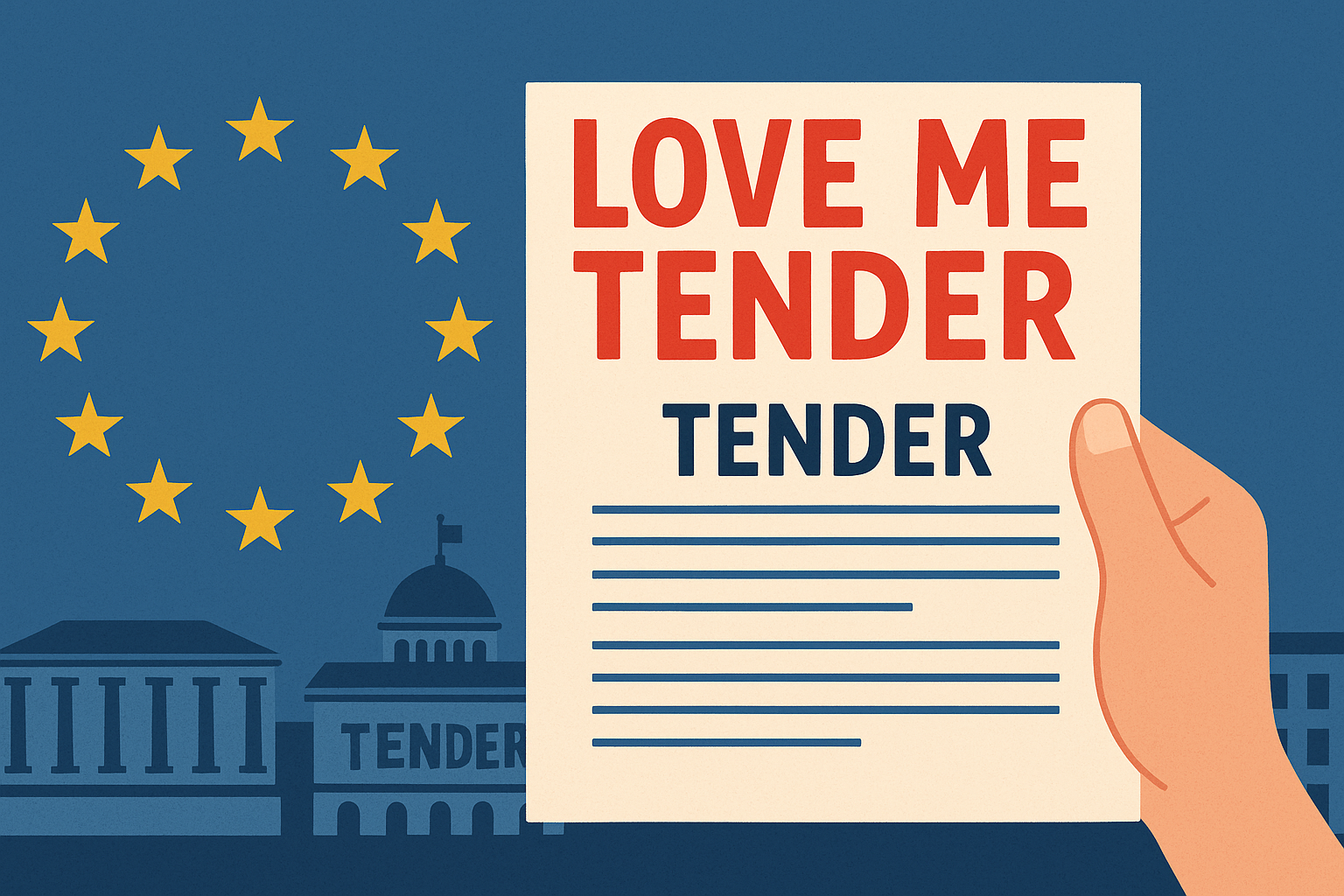
Public tenders for the procurement of imaging equipment and cartridges continue to present serious challenges for OEM cartridge remanufacturers. In the EU, the outright exclusion of remanufactured OEM cartridges from public tenders is illegal. Challenging such tenders is an ongoing task for ETIRA.
It is unacceptable that some public bodies violate EU competition law by preventing bidders from offering remanufactured OEM cartridges. ETIRA intervenes wherever we discover these unlawful exclusions. Over the past two years, ETIRA has formally protested against around 25 tenders in Germany, Spain, Italy, Romania and France, which initially excluded remanufactured cartridges. In most cases, the public authority backed down and eventually allowed remanufactured products to be included.
Other tender-related problems arise when unscrupulous traders abuse the system. In several recent cases, ETIRA exposed firms that won tenders by offering remanufactured cartridges on paper, only to supply polluting single-use cartridges instead. ETIRA notified the relevant authorities and demanded that the delivered products be tested for compliance with the tender criteria.
Abuse also includes the submission of false information to qualify for a tender. In one recent case in Italy, ETIRA exposed bidders who falsely claimed their products held Type-1 ecolabel certification.
If you have encountered similar issues, don’t hesitate to get in touch with info@etira.org to explore how ETIRA can assist you in responding.
ETIRA vs ETRIA: 1-0
June 30, 2025

In 2023, Ricoh asked the EU’s brand registration authority, EUIPO, to register the brand “ETRIA” for its printer manufacturing joint venture with other OEMs. ETIRA opposed this registration, as did EDRIA GmbH, a company based in Bamberg, Germany. Like ETIRA, EDRIA argued that registering “ETRIA” would create confusion among customers.
ETIRA entered a period of negotiations with Ricoh, temporarily suspending our opposition. EDRIA, however, continued its challenge — and with success. On 13 June 2025, the EUIPO ruled in favour of EDRIA, finding a likelihood of confusion for the public. The EUIPO concluded that the opposition was well founded, and that the brand “ETRIA” must be rejected for all the contested services.
In line with this ruling, the EUIPO also suspended Ricoh’s opposition to ETIRA’s separate application to extend our existing ETIRA brand registration to cover printers as well.
Ricoh now has until 13 August 2025 to appeal. If no appeal is filed, the brand “ETRIA” will never come into use, and their opposition to our application to extend the ETIRA brand will also lapse.
ETIRA is baffled as to how this situation ever arose. Ricoh could have chosen from millions of other names for this joint venture. Surely, their trademark consultant must have noticed the obvious resemblance to existing brands.
ETIRA Members Unite in Tallinn to Shape a Fairer, More Sustainable Market
May 21, 2025
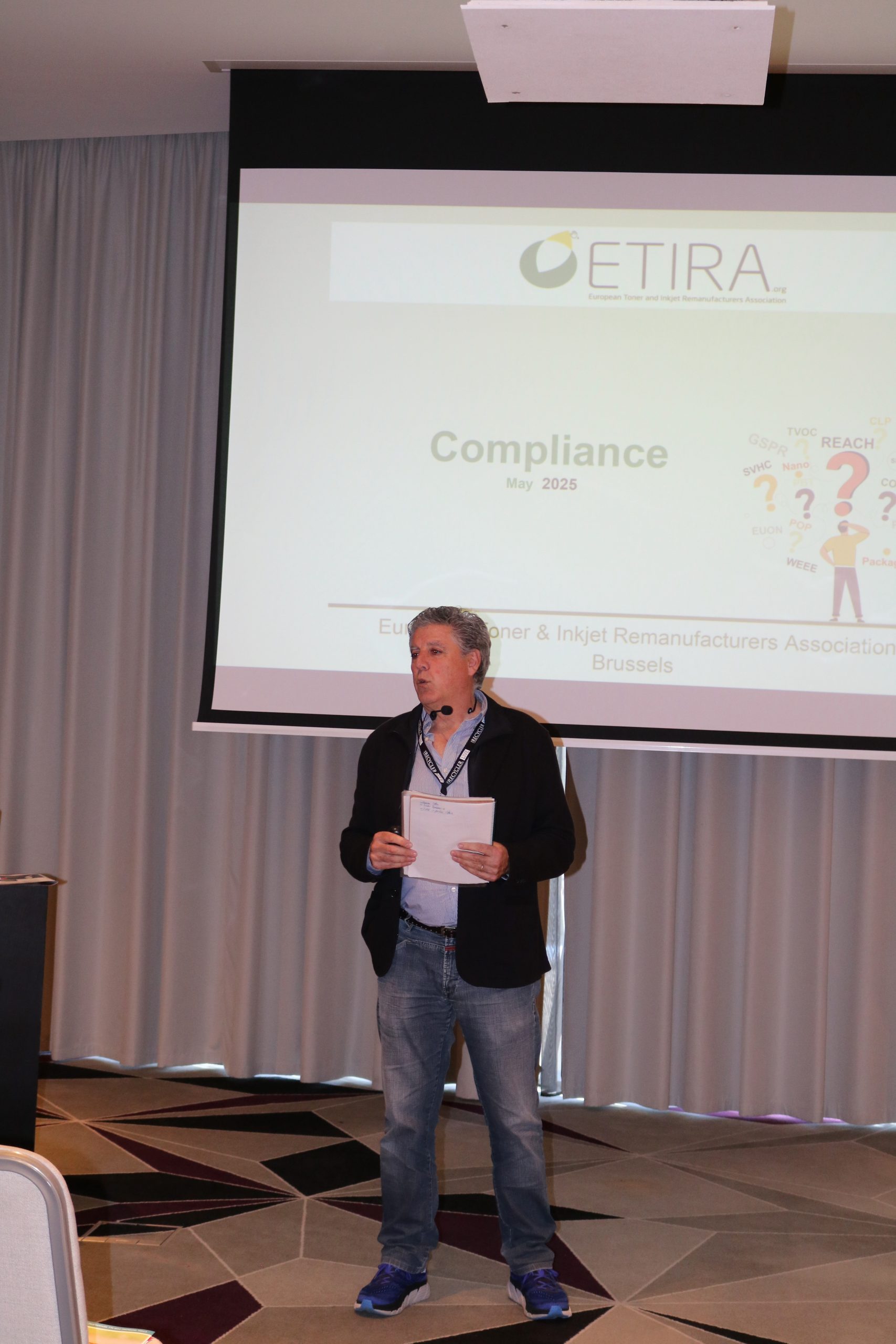
A conference focused on compliance and the circular economy
The main conference day on 14 May brought together expert voices from across the industry. Sessions explored the intersection of circularity, chip technology, regulatory change, and business resilience. Jason Doran (Zhono) addressed barriers to reuse created by chip design, while Keypoint Intelligence presented new research on shifting print behaviours. ETIRA board member David Connett challenged businesses to embrace purposeful print, with a focus on trusted, compliant, high-value services aligned to future market needs.
Contributions from Richard Catley (Ricoh) and Juan Carot (Brother UK) further underlined the importance of the circular economy. They shared the remanufacturing journeys of their respective companies and the operational realities of delivering sustainability at scale.
In the afternoon, Jan de Kesel introduced the emerging role of Digital Product Passports in supporting transparency and compliance. The final two sessions centred on ETIRA’s work: Secretary General Vincent van Dijk gave a comprehensive update on Brussels-level policy, including progress on Ecodesign, sustainability, and anti-greenwashing rules. He also introduced the ETIRA 2025 Report, which outlines the association’s priorities and action plan for the year ahead.
Download the ETIRA 2025 Report here.
ETIRA President Javier Martínez then led a workshop on market risks and enforcement challenges, offering practical advice on WEEE, REACH, and other core compliance responsibilities.
ETIRA AGM: Strategy, oversight and new leadership
Following the conference, ETIRA members held the association’s Annual General Meeting. Members approved the 2024 accounts and adopted the 2025 budget. Elections to the ETIRA board were also held. The newly elected board is as follows:
- President: Javier Martínez
- Vice-President: Gerwald van der Gijp
- Board Members: Sara Ferreri, Jan-Michael Sieg, Peter Knak, Volker Kappius, and David Connett
Milan Banjac did not stand for re-election, and the general assembly thanked him for his valued contribution to ETIRA over the past years.
The AGM reaffirmed ETIRA’s strategic priorities: strengthening advocacy, particularly regarding the upcoming EU ecodesign regulation on the printing industry, ensuring fair market access, improving compliance, and supporting members across Europe in the transition to a more sustainable, circular economy.
Trade Day: Dialogue and deeper connections
On 15 May, the focus shifted to informal engagement. ETIRA members and other delegates took part in Trade Day, a slower-paced, high-value networking session that enabled deeper conversations between industry peers, supporters, and potential partners. One-to-one discussions, product demos and tabletop presentations helped build relationships and extend the dialogue begun during the conference.
Looking ahead
ETIRA remains committed to delivering a level playing field for remanufacturers across Europe through informed lobbying, practical support, and continued collaboration with its members. Events like The Recycler Live provide an essential meeting point to reinforce shared values, assess emerging risks, and drive the transition to a more sustainable, compliant and competitive imaging sector.
Tags
2025ETIRA AGM
Tallinn
ETIRA Calls for Urgent Action on Non-Compliant E-Commerce Imports
March 19, 2025
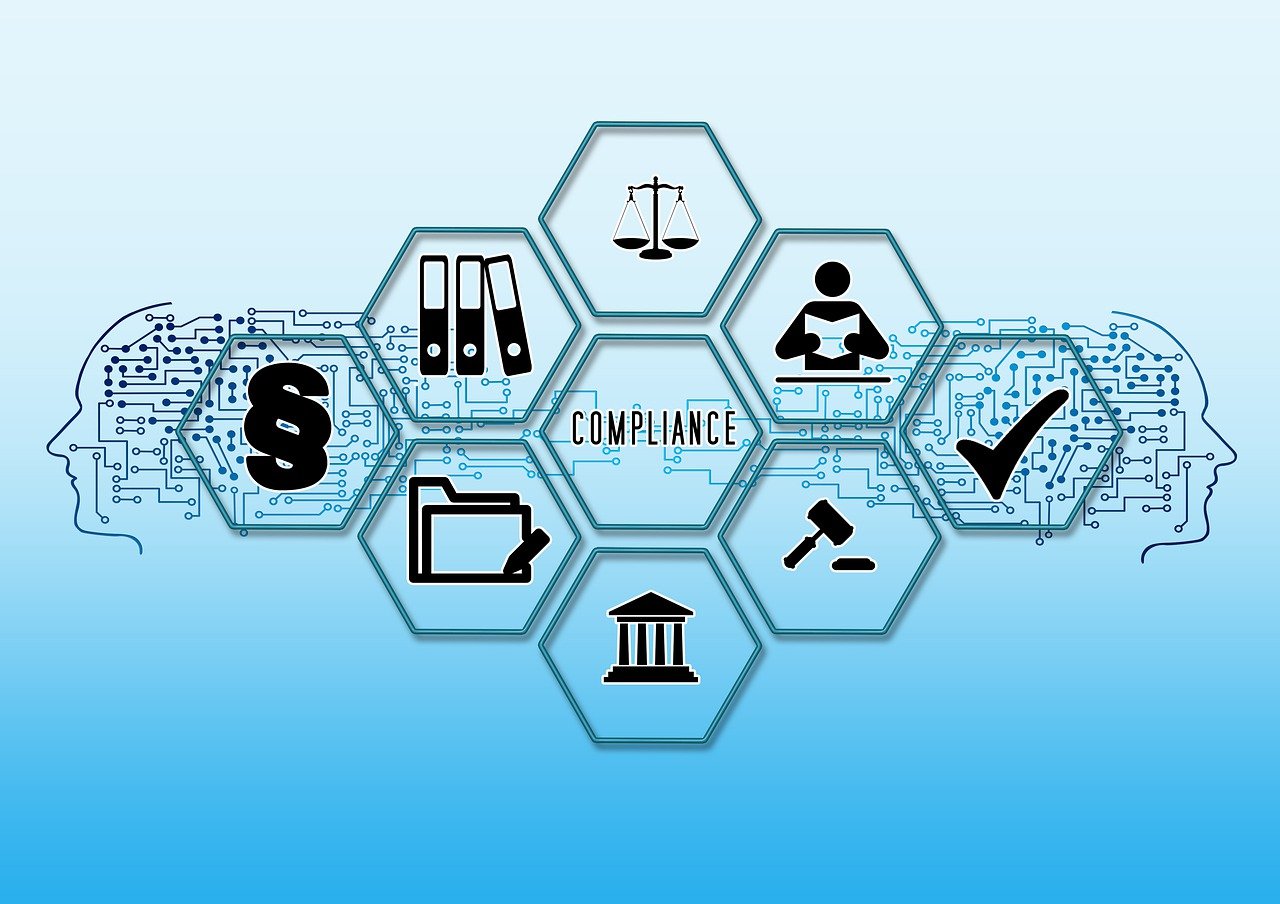
ETIRA welcomes the European Parliament’s strong stance against non-compliant e-commerce imports, which continue to undermine fair competition and endanger consumer safety. The Own Initiative Report on Product Safety and Regulatory Compliance in E-Commerce and Non-EU Imports highlights the urgent need to close loopholes that allow online marketplaces to sell low-cost office imaging consumables while avoiding EU duties, WEEE take-back obligations, and other compliance requirements.
The rise of online marketplaces has created a free-for-all for non-EU sellers, many of whom operate outside the reach of EU regulators. They ship cartridges and toners in small parcels, often misdeclared to evade customs duties, safety checks, and environmental regulations. Meanwhile, European remanufacturers must comply with strict WEEE, REACH, and RoHS regulations, invest in take-back schemes, and ensure their products meet the highest safety and environmental standards.
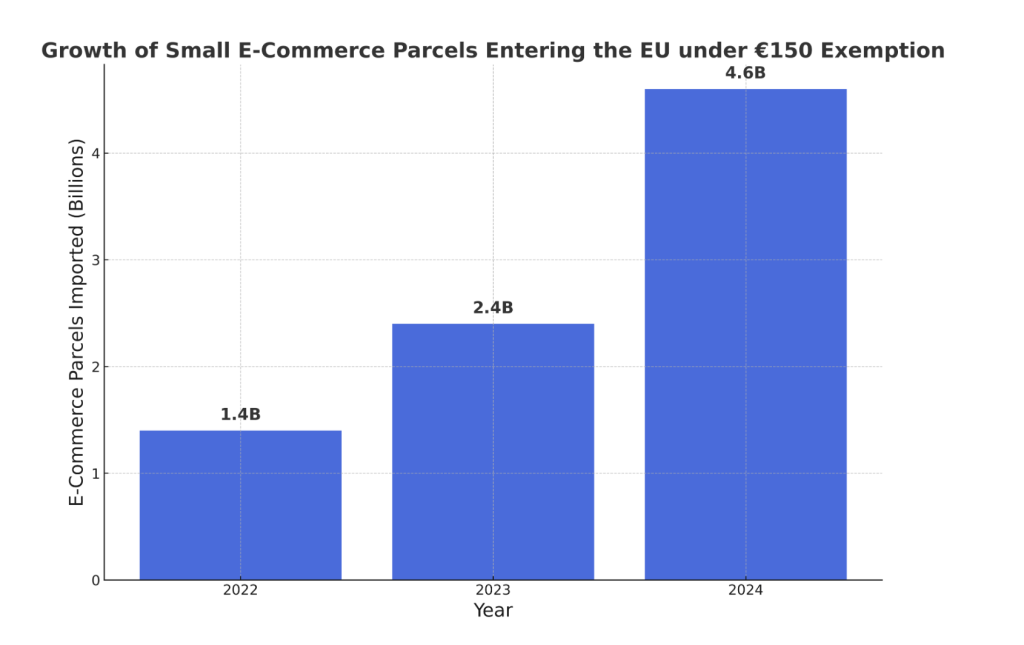
Graph created by ETIRA, based on data from the European Parliament’s 2025 report on e-commerce and regulatory compliance.
In 2024, 4.6 billion small e-commerce parcels entered the EU under the €150 customs duty exemption, double the figure from 2023 and triple that of 2022. Many of these shipments bypassed customs checks, flooding the market with cheap, disposable imaging consumables that do not meet EU safety and environmental standards. The cost to European businesses has been immense, with legitimate remanufacturers struggling to compete against products that are neither taxed nor required to meet EU sustainability regulations.
To tackle this growing problem, the European Parliament has proposed urgent reforms. A key recommendation is the removal of the €150 customs duty exemption, which has been widely exploited by non-EU sellers to undercut compliant European businesses. Ending this exemption will ensure that all imports, regardless of value, are subject to the same tax and regulatory requirements, creating a fairer competitive environment.
Another critical measure is stronger enforcement by customs and market surveillance authorities. Current enforcement efforts are inadequate, as authorities lack the resources to inspect the sheer volume of small parcels entering the EU. Many of these products are non-compliant, yet they pass through customs unchecked. Greater investment in customs controls, data-sharing, and regulatory oversight is urgently needed to ensure that non-compliant products are identified and stopped before they reach the market. More testing facilities for e-commerce products would help to identify non-compliant goods before they enter the single market. And new technology can help to enhance enforcement: AI, blockchain, and IoT are essential for improving e-commerce regulation and market surveillance to monitor product listings, automate inspections, and perform risk assessments.
The report also highlights the responsibility of online marketplaces in tackling this issue. Many of these platforms operate as intermediaries rather than direct importers, allowing them to sidestep liability for non-compliant products. The European Parliament calls for stricter rules that hold platforms accountable for ensuring that all products sold on their sites meet EU safety, environmental, and tax requirements. If a marketplace profits from the sale of these products, it must also share in the responsibility for compliance.
ETIRA Calls for Industry-Wide Action to Tackle Non-Compliant Printer Cartridges
February 26, 2025

The European Toner & Inkjet Remanufacturers Association (ETIRA) is calling on all responsible stakeholders across the European market—remanufacturers, OEMs, wholesalers, distributors, retailers, repair and recycling businesses, public sector buyers, and environmental organisations—to join us in demanding urgent action from the European Commission.
Every year, millions of non-compliant and illegal printer cartridges flood into the EU, bypassing essential environmental and safety regulations. These products undermine the circular economy, threaten consumer safety, and cripple legitimate businesses that invest in sustainability. Without a strong, coordinated response, Europe’s vision for a greener, fairer printing market will be lost to non-compliant imports and unsustainable practices.
The Crisis We Must Address
- Illegal and non-compliant cartridges dominate the market, evading Extended Producer Responsibility (EPR) rules, failing REACH and CLP safety requirements, and misleading consumers with fake certifications.
- The share of genuine remanufactured cartridges has plummeted, forcing many remanufacturers out of business and costing thousands of green jobs.
- The European Commission’s studies confirm that cartridge reuse could reach 85%, yet this target remains unachievable without action against illegal imports.
Our Demands for a Fairer and Greener Market
ETIRA is calling on the European Commission to:
✅ Prioritise enforcement by designating printer cartridges as a Priority Control Area (PCA), ensuring proper oversight by Market Surveillance Authorities (MSAs) and the European Chemicals Agency (ECHA).
✅ Hold online marketplaces accountable for enabling the sale of non-compliant products, making them share responsibility for compliance enforcement.
✅ Introduce a system similar to the Digital Product Passport (DPP) for printer cartridges, ensuring transparency, compliance verification, and informed consumer choices.
✅ Strengthen border controls and customs enforcement to prevent non-compliant products from entering the EU market.
✅ Embed sustainable public procurement rules to ensure that public sector buyers prioritise genuine remanufactured products over disposable, non-compliant imports.
✅ Increase funding and resources for Market Surveillance Authorities (MSAs) to enforce compliance effectively.
Join the Campaign – Let’s Demand Change Together!
No single organisation can win this fight alone. We need the entire European printing industry to stand together. Whether you are a remanufacturer, an OEM, a distributor, a retailer, or a business committed to sustainability, your voice matters.
📢 ETIRA is calling on all stakeholders to unite and campaign for stricter enforcement, fair competition, and real sustainability in the European market.
📧 Contact ETIRA today at info(at)etira.org, to support our campaign, co-sign our letter to the EU, and help shape the future of our industry. Together, we can ensure a cleaner, fairer, and more sustainable future for printing in Europe.
🔗 Spread the word! Please share this message, co-sign our letter to the EU, and stand with ETIRA.
Co-Signatories:
Belgium:
ETIRA European Toner & Inkjet Remanufacturers’ Association
Recyca BV
Germany:
CM Printing GmbH
Delacamp
Italy:
PACTO Association
Refilservice srl
Sapi SRL
Spain:
IMEX EU Trading SL
GENERAL MACHINES TECHNOLOGY, S.L.
United Kingdom
ECS – Effective Consumable Solutions
Honest Inks Ltd.
Keypoint Intelligence
Tags
2025Campaign
Non-Compliance
Circular Planet: A Closed-Loop Farce Disguised as Sustainability?
January 22, 2025
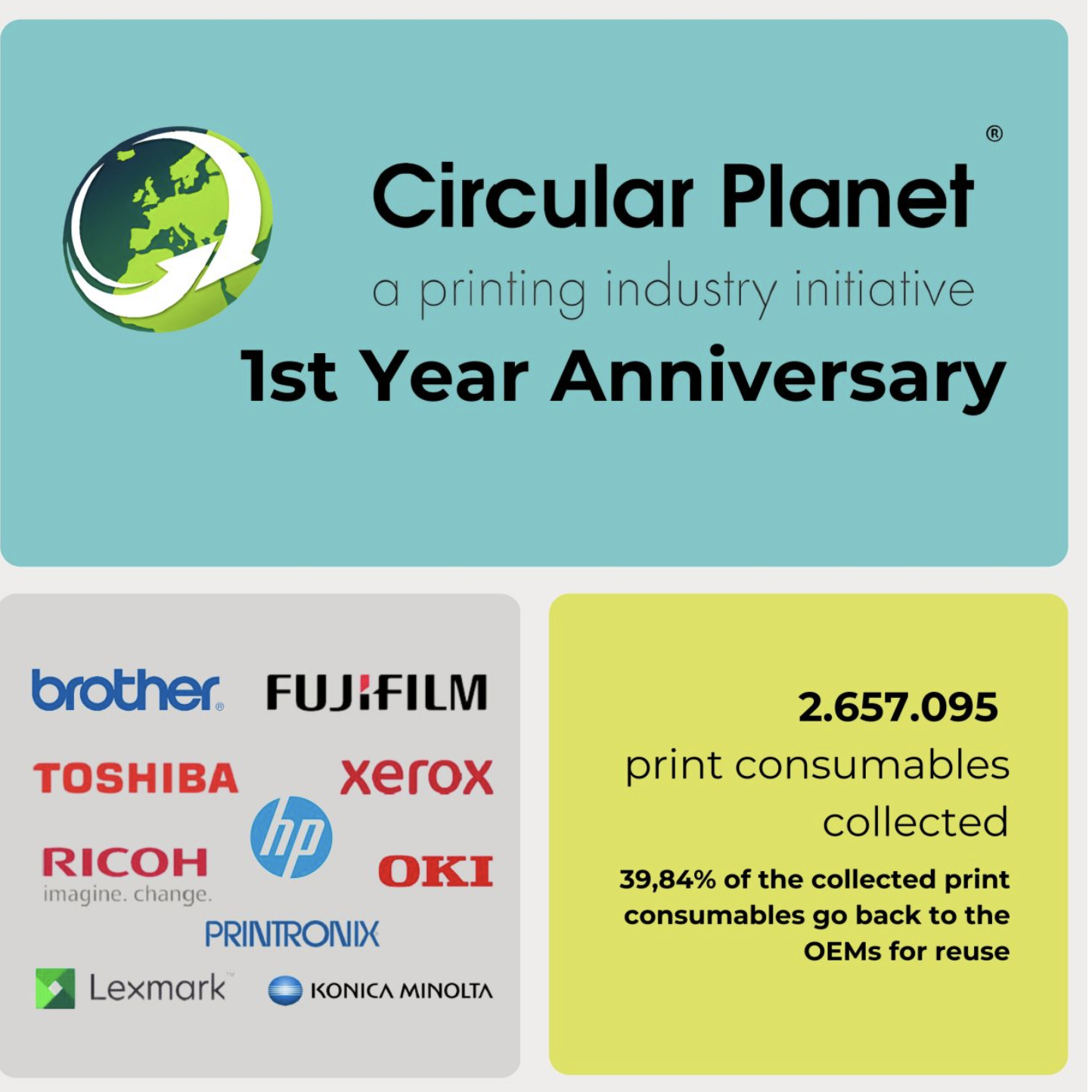
Circular Planet, the much-celebrated OEM-led cartridge collection initiative, recently marked its first anniversary, hailing the collection of 2.6 million print consumables and boasting that nearly 40% were “sent back to OEMs for reuse.” On the surface, it seems like a sustainability success story, but upon closer inspection, this programme raises significant concerns.
What Does “Reuse” Actually Mean?
The term “reuse” is at the heart of Circular Planet’s claims, but its meaning is far from clear. Does it mean cartridges are reused as cartridges — cleaned, refilled, and returned to market? Or does it refer to the mere recycling of parts? The lack of clarity leaves room for significant greenwashing.
Moreover, sending 40% of the collected cartridges “back to OEMs” does not guarantee they are reused in any meaningful way. OEMs could just as easily dismantle, recycle, or even discard these cartridges without ever returning them to their intended purpose. Without transparency or third-party oversight, these claims of “reuse” seem hollow at best and misleading at worst.
Numbers That Don’t Add Up
Circular Planet’s collection of 2.6 million cartridges represents less than 1% of the estimated 300–400 million OEM cartridges placed on the European market annually. Of those, only around one million cartridges were supposedly “reused” — a figure that pales in comparison to the programme’s lofty sustainability rhetoric.
And what about the logistics? The idea of cartridges collected in southern Spain being sent to the Netherlands, processed at a Polish facility, and then returned to the original printer in Spain raises serious questions about economic, environmental, and social benefits. Is this truly circularity, or just a wasteful shuffle masked as sustainability?
Undermining the Reuse Sector
For over 25 years, independent remanufacturers have championed true circularity by reusing cartridges multiple times, reducing waste and lowering environmental impact. In contrast, Circular Planet centralises cartridge returns to OEMs, cutting off access to high-quality reusable cores for the independent sector.
For every cartridge collected under Circular Planet, one less cartridge is available for independent remanufacturers, who have long demonstrated their commitment to reducing the environmental footprint of print consumables. This monopolisation of the cartridge lifecycle undermines open circularity and exacerbates the supply shortage, leaving smaller players in the reuse sector struggling to survive.
A Veil for Unfair Competition?
OEM control of the cartridge collection and reuse process raises serious questions about anti-competitive practices. By monopolising access to used cartridges, OEMs can restrict independent remanufacturers from competing, stifling consumer choice and driving up costs. This lack of competition benefits no one except the OEMs themselves.
Is this a collaborative sustainability effort, or simply a cartel-like operation disguised as an environmental initiative? The absence of freely available empty cores and transparent pricing reinforces these concerns.
The Way Forward
Circular Planet’s first year has revealed what’s possible — and what’s problematic. If the programme is to genuinely contribute to a sustainable future, it must redefine its approach:
- Clarify “Reuse”: The term must unequivocally mean reuse as a cartridge, not mere recycling or disposal of parts.
- Ensure Transparency: Independent audits must verify the fate of collected cartridges, holding OEMs accountable.
- Collaborate with the Reuse Sector: Circularity must involve all stakeholders, not just a monopolistic few.
At ETIRA, we call for a balanced approach that upholds the principles of the circular economy, ensuring sustainability is not just a corporate PR exercise. The next chapter of Circular Planet must be about inclusivity and genuine environmental stewardship. Let’s hold them accountable to that standard.
Tags
CircularEconomyETIRA
Greenwashing
SustainableBusiness
ETIRA’s 2025 Vision: Tackling Non-Compliance and Championing Sustainability
January 13, 2025

As Europe’s office imaging market enters 2025, ETIRA calls for more vigorous enforcement and a unified push towards sustainable, compliant remanufacturing.
The European office imaging market faces a pivotal year in 2025, marked as a tipping point where rising economic pressures and tightening regulations reshape the industry. The European Toner and Inkjet Remanufacturers Association (ETIRA) is intensifying its efforts to tackle long-standing challenges and seize emerging opportunities for its members.
“2025 will test our industry’s resilience,” said Javier Martinez, ETIRA president. “But it’s also a chance to double down on compliance, sustainability, and fair competition.”
The Compliance Battle Intensifies
A top priority for ETIRA is addressing the ongoing influx of non-compliant imports. Despite years of advocacy, cartridges failing to meet EU standards—lacking CE markings, WEEE registration, or REACH compliance—continue to dominate market share, often entering through online platforms.
ETIRA highlights a growing EU-wide effort to hold online marketplaces accountable. An Online Sales Compliance team at the European Parliament is actively working to make platforms fully responsible for the products sold. ETIRA is engaging with this team to drive progress and align strategies.
“The unchecked flow of non-compliant imports undermines everything we’re working towards,” said Martinez. “2025 must be the year we see stronger enforcement and penalties across all EU member states.”
ETIRA urges greater collaboration among national authorities, industry stakeholders, and EU institutions like ECHA (REACH) and Market Surveillance Authorities (MSAs) to eliminate regulatory loopholes and penalize offenders.
Sustainability as a Growth Driver
With the EU’s circular economy agenda gaining momentum, 2025 represents a significant opportunity for compliant remanufacturers. ETIRA is championing remanufactured cartridges as cost-effective, environmentally responsible alternatives perfectly aligned with EU sustainability goals.
“The demand for sustainable solutions is growing, and remanufactured cartridges are ideally positioned to meet that demand,” said Martinez.
ETIRA strongly advocates for the inclusion of product criteria similar to those envisioned for Digital Product Passports (DPPs). These criteria would provide essential information about a product’s compliance, sustainability credentials, and remanufacturing history, empowering buyers to make informed choices.
Economic Challenges in 2025
The backdrop for ETIRA’s efforts is a challenging economic environment. Corporate bankruptcies surged in 2024, and the new year brings heightened inflation, rising energy costs, and interest rates.
These pressures are influencing office imaging sector trends. Businesses are increasingly opting for remanufactured cartridges as value-driven alternatives while delaying investments in new printers, relying instead on existing equipment.
“This environment reinforces the need for high-quality, compliant remanufactured consumables,” said Martinez. “But it also underscores the importance of fair competition—non-compliant products hurt both the environment and the economy.”
Looking Forward: ETIRA’s 2025 Agenda
ETIRA’s roadmap for 2025 includes:
- Advocacy for Fair Competition: Collaborating with EU institutions to strengthen enforcement against non-compliant imports and create a level playing field.
- Promoting Sustainability: Raising awareness about the benefits of remanufactured cartridges in achieving EU circular economy targets.
- Digital Product Passport-Type Information: Championing DPP-like product information to enhance market transparency and reward compliant businesses.
- Supporting Members: Providing resources and advocacy to help remanufacturers navigate economic and regulatory challenges.
A Vision for the Future
As Europe’s office imaging market adapts to the complexities of 2025, ETIRA remains committed to protecting and promoting its members’ interests. The association aims to secure a stronger, more competitive future by prioritising compliance, sustainability, and collaboration.
“2025 is a year of action,” said Martinez. “If we work together, we can overcome challenges and ensure a thriving, sustainable remanufacturing industry.”
Tags
2025circular economy
Compliance
ETIRA: New Non-OEM Cartridges – A Threat to Compliance, Sustainability, and Public Health
November 28, 2024

Recent compliance checks reveal widespread violations of EU regulations, endangering the environment and the health of citizens.
BRUSSELS/BREDA – 28 November 2024—The European Toner and Inkjet Remanufacturers Association (ETIRA) has issued an urgent warning to European buyers: new non-OEM cartridges are high-risk and often blatantly illegal. ETIRA investigations revealed that 75% of these products fail to meet EU standards, with only 8% fully compliant. In contrast, remanufactured OEM cartridges performed significantly better, with 85% meeting most or all regulations.
Key Findings from ETIRA’s Compliance Checks
From July to November 2024, ETIRA reviewed approx. 50 new non-OEM toner and remanufactured OEM cartridges across Germany, France, the Czech Republic, Romania, Spain, and Italy. Products were sourced from major suppliers, including Plate Bürobedarf, Kaut-Bullinger, Ribbex, Backhausen, HQ-Patronen GmbH, TonerPartner GmbH, “Stefan Brogno tintendienst.de,” Tonerdumping., Hispamicro, Muchocartucho, Inkcloud, Inforpor (Xerox), Linsed, Life 365 Italy, Alphaink, Ecostore, Buffetti, TS Bohemia, Mall/Allegro, and Compatible cz.
Key results:
New Non-OEM Cartridges:
- 75% failed basic documentary compliance checks regarding permanent CE and Wheelie bin marks, entry in the national WEEE registry, and, where required, packaging registry and Declaration of Conformity.
- Packaging frequently lacked accurate supplier information, or only listed suppliers outside the EU.
- Often carried the CE logo without meeting the EU standards it stands for
- Instances of false labelling as being a remanufactured OEM product
One of the most troubling findings was the non-compliance of products purchased from Ribbex, a prominent supplier in Germany. Cartridges in boxes labelled as “Rebuilt” and “Made in Germany” were, in fact, new non-OEM cartridges imported from SE Asia by a Portuguese entity.
Remanufactured OEM Cartridges:
85% were relatively compliant, with only one supplier missing from the national WEEE registry.
Hazardous Practices Continue
These findings echo ETIRA’s product tests performed in the past, which showed new non-OEM toner cartridges often failed hazardous chemical checks, including decaBDE and toner emissions. These products endanger public health, the environment, and legitimate businesses.
ETIRA Demands Stronger Enforcement
ETIRA is taking decisive action by reporting violations to national market surveillance authorities and exposing buyers of non-compliant products.
“The EU’s circular economy demands stronger enforcement against hazardous chemicals and illegal goods,” said Javier Martinez, ETIRA President. “Over 30% of the market is illegal, threatening fair competition, environmental care, and consumer health—urgent action is essential.”
What Buyers Should Know
ETIRA reminds buyers and suppliers that non-OEM cartridges must comply with REACH, WEEE, and other EU directives. Importers are responsible for ensuring compliance, and failure to do so risks legal penalties.
